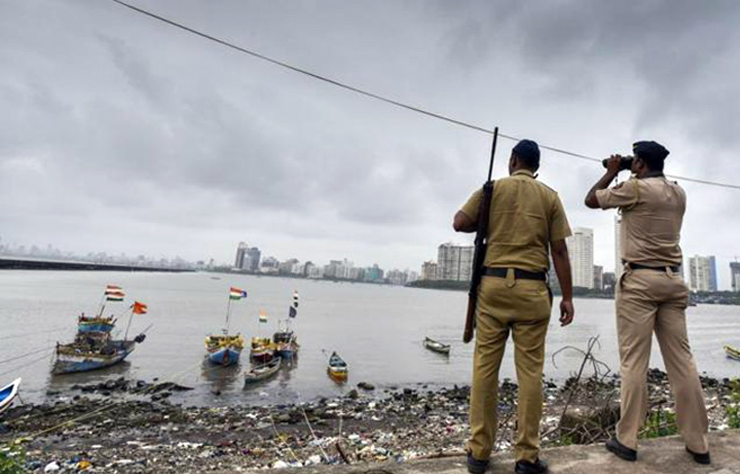
At an event in Kochi, N Ravi (Deputy Inspector General, Indian Coast Guard) clearly urged fishermen to act as “eyes and ears” for national maritime security and safety agencies recognizing their importance in coastal security. He observed that “The ICG remains committed towards protection and safety of life at sea” and called for “integration of fishermen in national efforts”.
The fishermen are regarded as an integral part of the coastal security architecture, there is a need to raise awareness among the coastal community by educating them about coastal security and bringing them in the mainstream of the Indian coastal security forces.
The 2008 Mumbai terror attack highlighted the operational gap among the security forces and the coastal community. It was this attack in particular which made the government announce the Coastal Security Scheme. Under the Coastal Security Scheme the overall aim is to develop maritime security infrastructure wherein the role of coastal communities has been recognized, several initiatives have been undertaken by the government to train and educate them to report and respond to any such incidents in future.
There seems some discontent among fishermen which has the potential to impede the effective operation of the coastal security architecture. While the fishermen have been cooperative in sharing information with authorities, they only do so with a few officials. They appear to be more at ease engaging with the Fisheries Department officers than with ICG or Indian Navy. As a result, in times of distress and when they notice something odd at sea, they first notify the Fisheries Department.
The coastal community is the first observant to any crime, mishap or calamities. The chain of communication that they have developed indigenously is precise and effective, given that it has been being built over years. This indigenous knowledge of coastal communities addresses several of the functional and communication gaps of the Indian coastal forces. In addition, the Community Interaction Programmes (CIPs) of the Indian Coast Guard with the fishers and coastal populace are conducted periodically by the ICG to sensitize them on security and safety issues, that in turn enables them to participate actively in the overall coastal security construct.[1]
The government has issued ID cards to all fishermen with a single centralized database. Registration of over 2 lakh fishing vessels operating off Indian coast and equipping fishing boats with suitable equipment, to facilitate vessel identification. The fishing communities are adept mariners and their cooperation is indispensable to national security. This has been achieved by spreading awareness in these communities through coastal security awareness campaigns that are conducted by the Indian Navy and Coast Guard, in all coastal districts of the country. During these campaigns fishermen were advised and warned not to cross the International Maritime Boundary (IMB) as it is in their interest in the context of their safety.[2]
The development of coastal communities is a critical area of interest in India as 18% of India’s population lives in 73 coastal districts. A majority of them are engaged in the marine sector related activities such as fisheries, tourism, resource development (salt production), etc. The fishermen possess indigenous technical knowledge (ITKs) such as marine expertise, skills, practices, ideas, experiences, and information gained and passed down orally from generation to generation within a community in a specific geographic location and frequently becoming part of its culture. It also encompasses know-how, experiences, and practices generated, used, and conserved by people who live in close proximity to their natural environment. An ITK is socially desired, economically viable, sustainable, involves little risk, and focuses on the efficient use of environmentally favourable resources.
As far as maritime legal knowledge is concerned, universities, think tanks and NGOs can be authorised to work and share the knowledge of laws, by-laws, notifications and orders passed by the Indian government and judiciary. The universities can formulate modules and syllabus for the purposes of training fisherman through workshops, conferences and inducting short and regular courses taking into consideration coastal security with immediate neighbours. These programs can also be extended to coastal communities and to the officers (executive and judiciary) to efficiently carry out their duties and responsibilities in their offices while monitoring, safeguarding and preventing any mishappening or crime.
Rashtriya Raksha University under the aegis of Ministry of Home Affairs can take lead for such initiatives by working on their education, training and research through awareness drive and activities. An attempt to prepare documentaries on the importance of coastal communities in securing seas providing constant support to the Indian Naval Forces can be a good policy initiative.
References
1. Global Security.org. Indian Coast Guard- Coastal Security. https://www.globalsecurity.org/military/world/india/cg-security.htm
2. Indian Navy. Initiatives to strengthen coastal security. https://indiannavy.nic.in/content/initiatives-strengthen-coastal-security
-The writer is a Research Associate at the Rashtriya Raksha University (RRU) and an advocate. His area of interest is Coastal and Maritime Security, Defence and Strategic Studies and International Law








